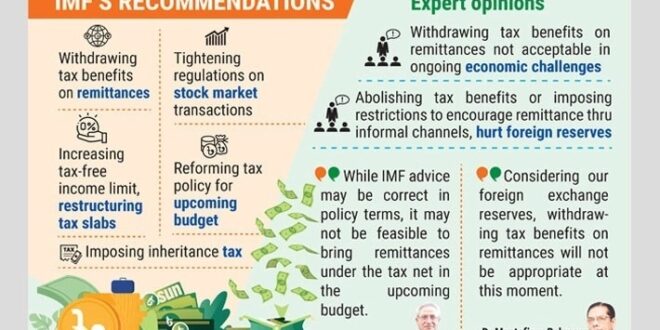Amid ongoing efforts to bolster foreign currency reserves and stimulate remittance inflow into the country, the International Monetary Fund’s (IMF) proposition to eliminate tax benefits on remittances has elicited a wave of disapproval from experts. Concerns abound that such a move could inadvertently drive these crucial funds into clandestine channels.
With the desired increase in foreign currency reserves yet to materialise, disruptions in import trade persist due to limited dollar supply, experts pointed out.
Against this backdrop, the advisability of withdrawing tax benefits on remittances appears questionable, potentially exacerbating risks in the currency market and complicating the financial sector further, they think.
The IMF recently suggested a series of tax reforms during a meeting with the National Board of Revenue (NBR), including the withdrawal of tax benefits on remittances and tightening regulations on stock market transactions.
The IMF’s proposal also encompasses restructuring personal income tax slabs to rationalise tax expenditure, abolishing tax benefits on capital gains, zero-coupon bonds, and investment rebates on bonds.
Additionally, it recommended raising the tax-free income limit from Tk3.5 lakh to Tk5 lakh.
Analysts caution that implementing such reforms amidst economic pressures may pose significant challenges. They point out that remittance income is often channelled through informal channels, and imposing restrictions could exacerbate this trend.
Moreover, the IMF’s recommendation to cancel tax exemptions for taxpayers in the private sector and various allowances for government employees adds complexity to the proposed reforms.
Dr Zahid Hussain, former lead economist of the World Bank’s Dhaka office, told the Daily Sun, “The IMF’s conditions must be fulfilled step by step. The organisation has mentioned the possibility of imposing taxes or withdrawing tax benefits on remittances. While IMF advice may be correct in policy terms, it may not be feasible to bring remittances under the tax net in the upcoming budget. Ignoring reality, this cannot be done.”
“However, before imposing taxes, the government may consider waiving the 2.5% subsidy on remittances in the upcoming budget, even though this initiative was taken to increase remittances in the banking channel, it did not work.”
He said, “Expatriates are sending more remittances through the informal channels than through banks. If taxes are imposed on remittances, the trend of sending remittances through the informal sector will increase further. These factors need to be considered.”
Meanwhile, the dollar rate for remittances in banks has increased significantly. In this context, there may be no need to retain this subsidy. However, in the long term, a tax policy should be formulated, he added.
When asked whether the remittance will decrease, he said, “It will not decrease. Because even with the subsidy, the desired remittance did not come through the banking channels. The gap between the dollar rates of banks and the open market needs to be reduced. Then remittances will increase through formal channels.”
He also said, “The policy of bringing all incomes under the tax net is correct. Taxation is divided into different slabs. Those with lower incomes will pay less tax, while those with higher incomes will pay more. This is the principle of a progressive tax system. Therefore, income from government jobs, remittances, and the stock market will all fall within its purview. The nature of taxation will depend on total income.”
The IMF has recommended tax reforms for the upcoming budget. Making the tax-free income Tk5 lakh is rational because inflation is still rising, he concluded.
Speaking to the Daily Sun, Dr Mustafizur Rahman, distinguished fellow at the Centre for Policy Dialogue (CPD), said, “At the moment, considering our foreign exchange reserves, withdrawing tax benefits on remittances will not be appropriate. If remittances become more stable, then these reforms can be initiated. Increasing reserves now and emphasizing financial and exchange rate stability are important.”
“The IMF has been discussing these other reforms for a long time, and they are still pending. We have repeatedly talked about tax reform. Depending on inflation and people’s situations, the tax-free income could be raised.”
Echoing Rahman, Dr Mohammad Abdur Razzaque, research director of the Policy Research Institute, said, “If taxes are imposed on remittances, it will put pressure on reserves. There are many areas for tax collection. Many taxable people have TIN certificates but do not pay taxes. Tax collection could be facilitated through growth centres in the country’s 64 districts.”
He also suggested an inheritance tax could be imposed. Currently, no tax is levied on the properties obtained through inheritance.
“It is advisable to specify the amount of tax to be levied here. He thinks tax-free income should be increased.”
At the beginning of last year, the IMF approved a $4.7 billion loan for Bangladesh, subject to the fulfilment of around 30 conditions, including rationalizing expenditure and enhancing fiscal discipline.
In pursuit of this objective, NBR has taken initiatives to reduce tax expenditure, as part of which some VAT and tax benefits were reduced last year. However, the government has refrained from imposing taxes on remittances for a long time.
Bangladesh sought a loan from the IMF in July 2022. After assessing the situation for six months, the organization decided to lend $4.7 billion to the country.
The money will be released in seven instalments over seven and a half years until 2026.
The country received $476.3 million as the first instalment of the loan on 2 February 2023. Last year on 13 December, Bangladesh received the second installment of $681 million.
(DS)
 Welcome to Business Outlook
Welcome to Business Outlook




